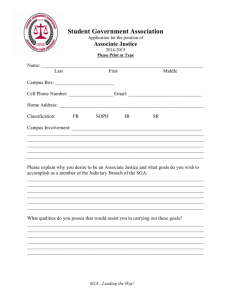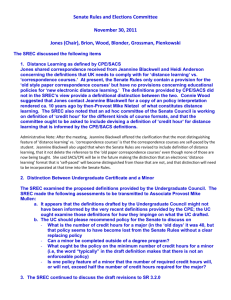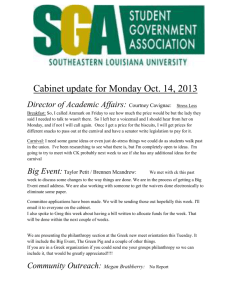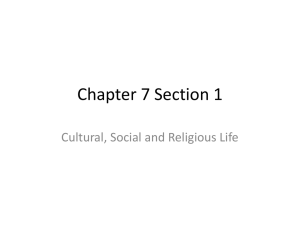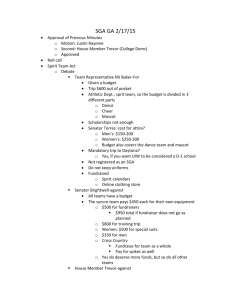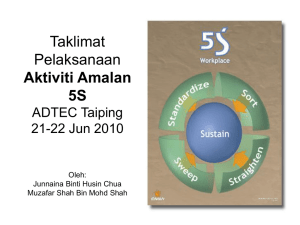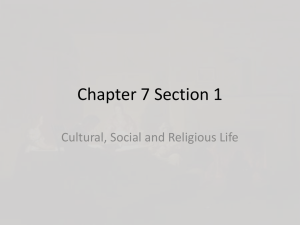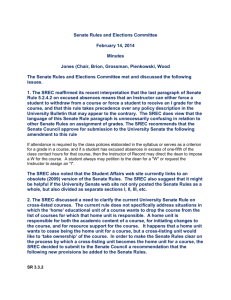DOC - University of Kentucky
advertisement
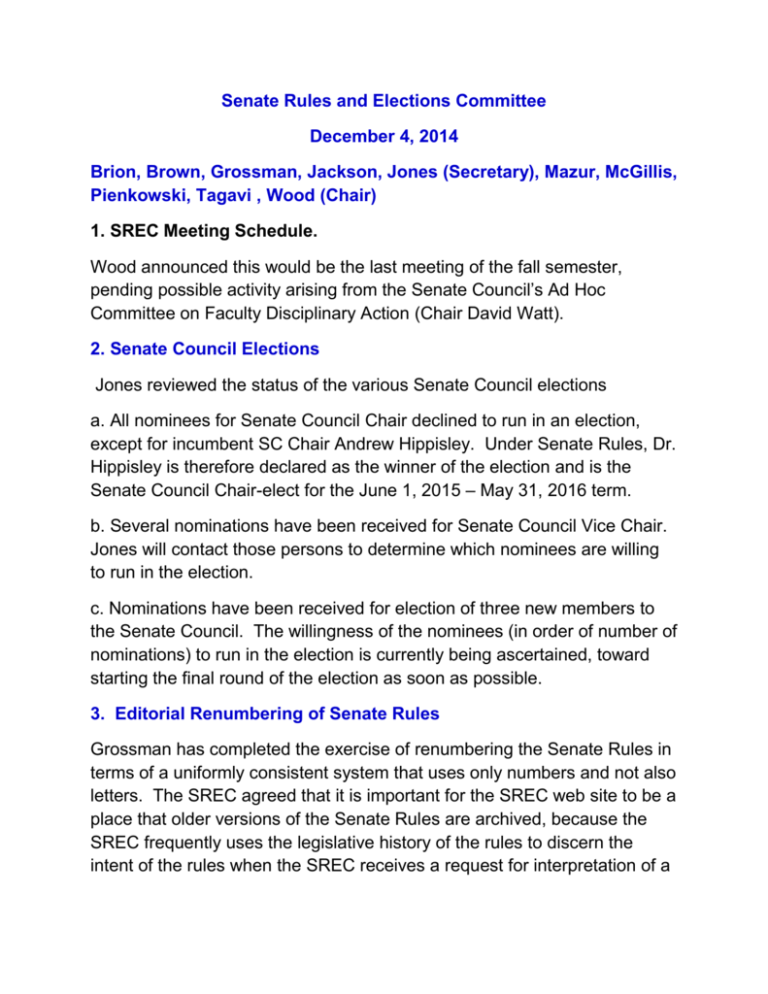
Senate Rules and Elections Committee December 4, 2014 Brion, Brown, Grossman, Jackson, Jones (Secretary), Mazur, McGillis, Pienkowski, Tagavi , Wood (Chair) 1. SREC Meeting Schedule. Wood announced this would be the last meeting of the fall semester, pending possible activity arising from the Senate Council’s Ad Hoc Committee on Faculty Disciplinary Action (Chair David Watt). 2. Senate Council Elections Jones reviewed the status of the various Senate Council elections a. All nominees for Senate Council Chair declined to run in an election, except for incumbent SC Chair Andrew Hippisley. Under Senate Rules, Dr. Hippisley is therefore declared as the winner of the election and is the Senate Council Chair-elect for the June 1, 2015 – May 31, 2016 term. b. Several nominations have been received for Senate Council Vice Chair. Jones will contact those persons to determine which nominees are willing to run in the election. c. Nominations have been received for election of three new members to the Senate Council. The willingness of the nominees (in order of number of nominations) to run in the election is currently being ascertained, toward starting the final round of the election as soon as possible. 3. Editorial Renumbering of Senate Rules Grossman has completed the exercise of renumbering the Senate Rules in terms of a uniformly consistent system that uses only numbers and not also letters. The SREC agreed that it is important for the SREC web site to be a place that older versions of the Senate Rules are archived, because the SREC frequently uses the legislative history of the rules to discern the intent of the rules when the SREC receives a request for interpretation of a rule. Sheila Brothers will be contacted to attain that available earlier versions become posted. 4. SGA Recommendations on Senate Rules Relating to UAB The SREC each of the 7 items forwarded by the SGA Senate President concerning Senate Rules relating to the UAB. Rule wording for which changes are suggested by the SGA or SREC are shown in red font. Item 1. 6.3.0 ACADEMIC OFFENSES AND PROCEDURES “Students shall not plagiarize, cheat, or falsify or misuse academic records.” The SGA recommended that the second “or” be deleted as redundant. The SREC interprets that the second “or” is not grammatically redundant and to remove it would constitute a substantive change in policy. The current wording has the meaning “Students shall not (a) plagiarize, (b) cheat, or (c) falsify or misuse academic records.” The recommendation of the SGA would cause the text to have the different meaning of “Students shall not (a) plagiarize academic records (b) cheat academic records (c) falsify academic records or (d) misuse academic records (a) and (b) in the ‘new’ meaning actually do not make regulatory or grammatical sense. Item 2. 6.3.1 Plagiarism “…When students submit work purporting to be their own, but which in any way borrows ideas, organization, wording or anything else from another source without appropriate acknowledgment of the fact, the students are guilty of plagiarism.” The SGA recommends changing “anything else” to “content.” The SREC agrees that this alternative wording clarifies the meaning of the sentence without making a substantive change in the sentence. Item 3. 6.3.2 Cheating Cheating is defined by its general usage. It includes, but is not limited to, the wrongfully giving, taking, or presenting any information or material by a student with the intent of aiding himself/herself or another on any academic work which is considered in any way in the determination of the final grade. The fact that a student could not have benefited from an action is not by itself proof that the action does not constitute cheating. Any question of definition shall be referred to the University Appeals Board. The SGA recommends that the first sentence of the above paragraph be deleted, as contributing ‘ambiguity’ to the definition of cheating. The SREC interprets that removal of that sentence will make a substantive policy change that is disadvantageous to students. The second sentence does not provide any boundaries to what cheating can be interpreted to include. The second sentence only lists examples of what is included in cheating and specifically states that cheating is not limited to those examples. The only boundary to what can be included in cheating is provided by the first sentence, that restricts a faculty member (and UAB) from including meanings that are outside of the “general usage” of that word. The SREC also noted that the Kentucky Revised Statutes require that when courts interpret the meaning of state law, the words used in the state law are to be construed in accordance with their common meaning (KRS 446.080(4)). Item 4. 6.4.0 Definitions D. "Notice" is given to a student: 1. in person, with a witness or a signed receipt by the student; or 2. in writing by regular mail to the student's address as it appears in the Registrar's records. The University is not responsible for a student's failure to maintain a current address in the Registrar's records. The SGA recommended changing the word “or”, as shown above, to “and.” The SREC interpreted that changing “or” to “and” would be a substantive policy change to the above rule. The above rule describes three different methods of notice to students. The SREC was not able to propose particular wording because it was not clear from the SGA document (“we are asking that two forms of communication are offered instead of just one”) which various combinations of two of the three above notice methods would meet the SGA’s request. The SREC asks that the SGA please clarify. Item 5. 6.4.0 (SGA proposed changes shown in red.) E. "Suspension" means forced withdrawal from the University for a specified period of time (at the end of which they will be is automatic academic reinstate[d]ment), including exclusion from classes, termination of student status, and termination of all related privileges and activities. Any student so punished would be eligible to apply for reinstatement at the conclusion of their suspension. F. "Dismissal" means termination of student status subject to the student's readmission as specified in paragraph 6.4.6(B). G. "Expulsion" means permanent termination of student status. It is to be invoked only in unusual circumstances and when the offense committed is of such serious nature as to raise the question of the student's fitness to remain a member of the academic community. The SGA requests that the wording shown in red (except for the strike through and underlining) above be added to “E.” The SREC interprets that the Senate Rules already mean that upon reaching the end of disciplinary suspension, the student is automatically in a status of academic reinstatement. Managerial implementation of that reinstated status is an administrative exercise between the student and University administration. The SREC suggests making the indicated further edit to the SGA edit of the existing single sentence of section of item “E.” These edits to the existing sentence constitute editorial clarification and not substantive change in existing policy. The SREC interprets that the additional sentence proposed by the SGA is actually disadvantageous to the students, because it appears to create a new policy in which students are not automatically reinstated when the suspension period ends, but instead the student must “apply” for reinstatement and someone must make a substantive judgment on the merits of the reinstatement. The SGA appears to confuse the automatic academic reinstatement with managerial implementation of that reinstated status. The SREC asks the SGA to please clarify the rationale for their comment. Item 6. 6.4.1 Jurisdiction A. If an instructor is not a faculty employee (for example, the instructor is a teaching assistant), then the faculty employee Instructor of Record who is ultimately responsible for signing the grade reports for the course shall normally assume the role of the instructor. However, with the agreement of the faculty employee Instructor of Record, the chair may decide either to allow the actual instructor to retain this role or to ask another employee who is directly involved with the course (for example, a course coordinator) to assume this role. In any case, the actual instructor should retain an important consultative role and shall participate in all UAB meetings as far as practical. The SGA recommends that it be made a procedural requirement that when the course instructor is the source of facts being used to determine an academic offense, that the course instructor must be present at the UAB meeting as a matter of procedure. The SREC agrees with the sentiment that generally an accused student should be able to confront their accuser. However, the wording proposed by the SGA does not allow for the (hopefully rare) circumstances in which the course instructor is not able to attend the UAB hearing. The SREC proposes the alternative wording above to render the proper sentiment but allow for the (hopefully rare) situations in which the course instructor cannot attend the UAB meeting. The above edit to the end of the last sentence would be a substantive change in policy. Item 7. 6.4.3 A. Initial Determination By the Instructor and Chair Allegation; Opportunity of Student to Respond. The instructor and chair shall review the evidence of an academic offense, and the instructor shall decide whether the evidence warrants an allegation of an academic offense. If so, the student shall be notified of the allegation and invited to meet with the instructor and chair to discuss the allegation and to state his or her case. Within 10 days after the evidence is received, the instructor and chair must make a reasonable effort to schedule the meeting. The instructor and chair shall set a deadline for the student to respond to the invitation to the meeting, but the deadline shall be no fewer than 7 days after the invitation is issued. 1. The SGA requests more specificity in what parameters surround “reasonable” in the above paragraph The SREC proposes the above inserted wording to meet the request of the SGA. The suggested change in wording would be a substantive change in policy.
